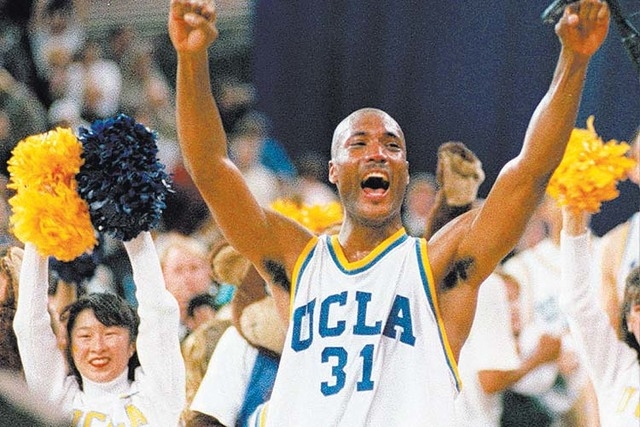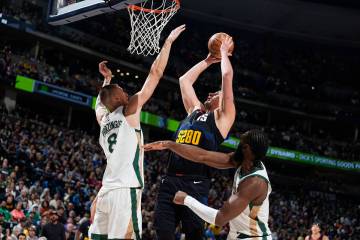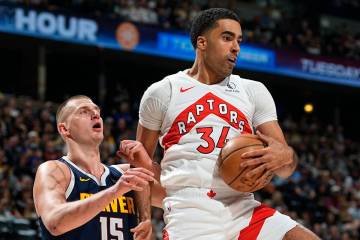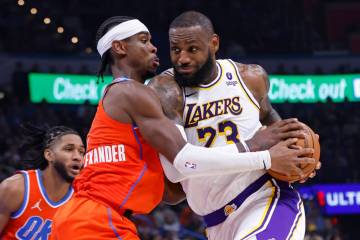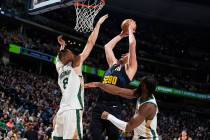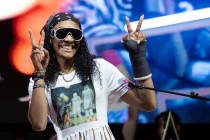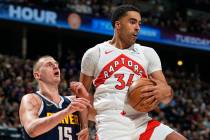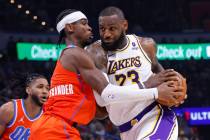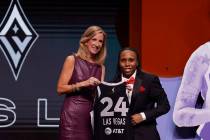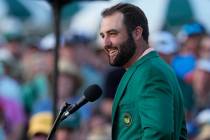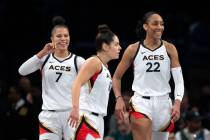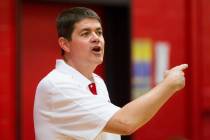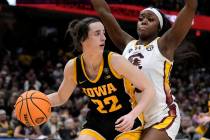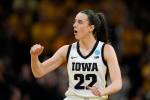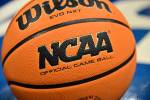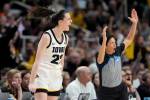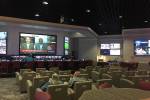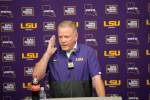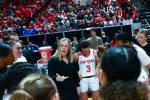Court win over NCAA emotional for O’Bannon
He was doing fine, talking about his victory over the NCAA, how thousands of future student-athletes will benefit from a judge’s decision Friday and how he was OK with not making a dime off a landmark case that made American sports history.
Then Ed O’Bannon lost it.
His eyes welling up in tears, his voice cracking, the 41-year-old former UCLA All-American who was MVP of the Bruins’ 1995 national championship team reflected on his five-year court battle with the NCAA and the emotional toll it had taken on him and his family.
“It was tough ... it was tough,” O’Bannon said Saturday at Findlay Toyota, where he works as a salesman. “When you do this and you know there’s no monetary gain, there’s certain pressures you endure, that you feel. You do everything you can to hold your head up and see it through. You hope it’s resolved and you hope the people who benefit are grateful.
“I’m glad it’s over.”
O’Bannon, along with 19 other plaintiffs who were skillfully guided by their attorney Michael Hausfeld, won the five-year case against the NCAA when a U.S. District Court judge ruled Friday that the NCAA had violated antitrust laws and conspired with its member schools and conferences to prevent student-athletes from receiving a share of revenues generated from their likeness.
Judge Claudia Wilken said the NCAA can cap the amount future student-athletes receive at $5,000 per athlete per year of competition. An athlete who stayed all four years would be eligible to receive $20,000 which would be held in a trust fund until the athlete graduated or completed their eligibility. That money would only be paid out if the school used the athlete’s likeness on television or a commercial enterprise such as a video game, which was the initial basis for O’Bannon’s lawsuit after someone pointed out to him that his image had appeared on an NCAA college basketball video game and O’Bannon had not been compensated for use of his image.
Wilken’s ruling doesn’t go into effect until July 1, 2016. The NCAA is expected to appeal.
“I’m very happy,” O’Bannon said. “I think it’s a major victory now and a step toward the future. It’s a victory now because there had been countless lawsuits on this subject that never got this far. There were walls we broke down. The ruling Judge Wilken gave was for the future.
“We didn’t bankrupt college athletics. That was a mainstay for us. (Football) Saturdays are still going to be special. There’s still going to be Madness in March.”
As for the NCAA appealing, O’Bannon said, “I’m expecting it. Once that happens you just deal with it and take it as it comes.”
Sonny Vaccaro, the long-time college basketball power broker who worked for Nike and adidas and had advised O’Bannon to take legal action against the NCAA back in 2009, said when he heard the news Friday afternoon, it was if he had encountered an out-of-body experience.
“For the first time in my life, I was speechless,” Vaccaro, 75, said from Los Angeles on Saturday. “I didn’t know what to do. But once I had a chance to digest everything, my first thought was, ‘Thank God it’s over.’ It had been such a long, hard battle. I thought back to all the things I had seen and personally been through with the NCAA going back to (former president) Walter Byers and the way they would unfairly go after people like Tark (Jerry Tarkanian) and seeing how wrong it was.
“What Eddie’s case has done was provide vindication for all the kids who the NCAA made money off of.”
O’Bannon finds himself in the company of Jackie Robinson, Muhammad Ali, Curt Flood and Spencer Haywood — athletes who helped invoke change in American sports. But O’Bannon doesn’t see himself among those crusaders.
“Am I comfortable with it? Absolutely not,” O’Bannon said. “Those men are legends and I can’t hold a candle to their lives and their careers.”
O’Bannon said he’s still trying to handle the enormity of Friday’s historic ruling.
“It’s a lot to take in,” he said. “It’s 99 pages and I haven’t finished it all. All of this has been a bit overwhelming. I’m hearing the word ‘monumental’ being applied to this, and I’m still trying to take all of this in.”
O’Bannon said he never considered settling with the NCAA even though he felt pressure to do so at times during the five-year court battle.
“We never thought of giving up,” O’Bannon said. “There were bad days. There were days we never thought it would end. But I go back to the day I saw my likeness in the video game. I knew something was wrong that had to be righted.”
Vaccaro said O’Bannon was the right person at the right time with the right case against the NCAA that he believed could prevail against the NCAA despite its vast legal resources.
“It was the perfect storm,” Vaccaro said. “We had the perfect time, the perfect lawyer in Michael and the perfect plaintiff in Eddie,” Vaccaro said. “He was a big underdog, but in my heart I knew what the answers were and he was in the right.”
O’Bannon said in the end, it was simply a matter of standing up in what you believed in and what you felt in your heart was the right thing to do.
“I think it’s a human right to control your likeness, and I’m grateful that Judge Wilken agreed,” he said.
Contact reporter Steve Carp at scarp@reviewjournal.com or 702-387-2913. Follow him on Twitter: @stevecarprj.



